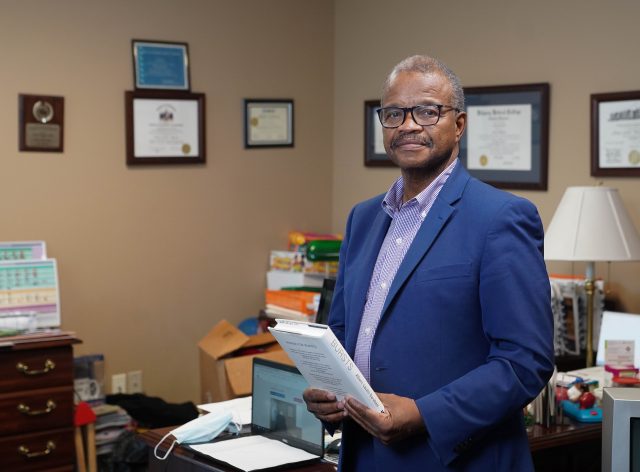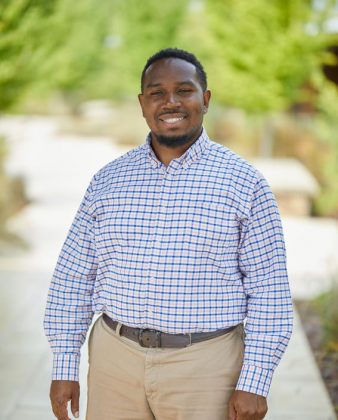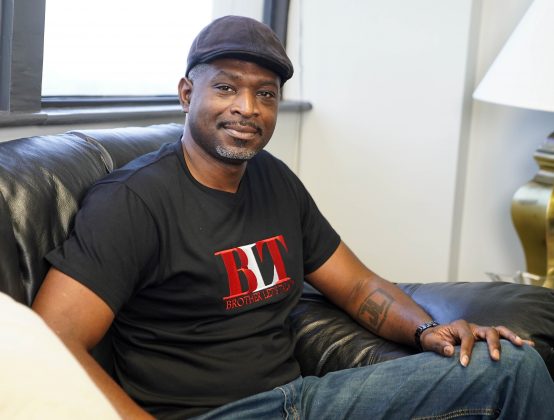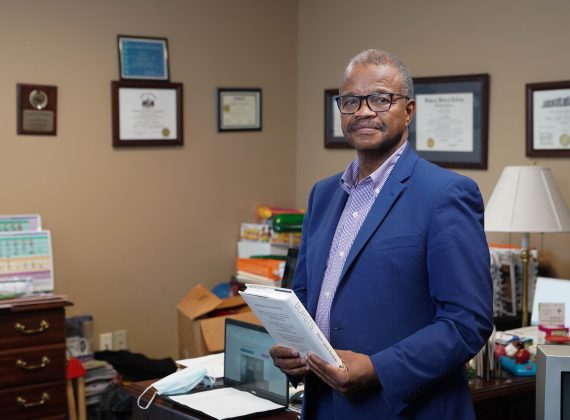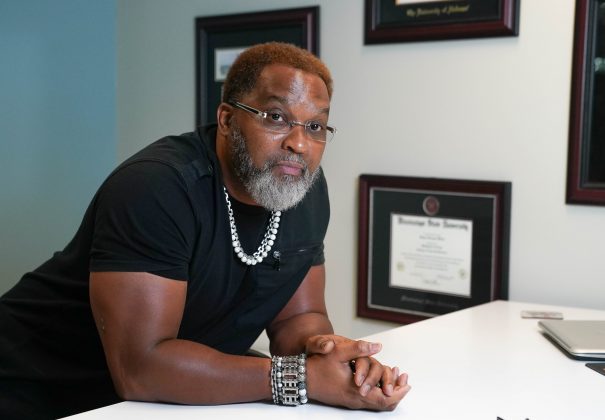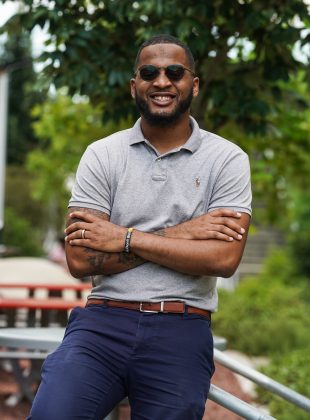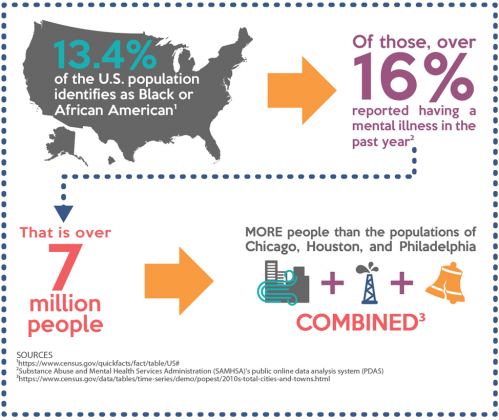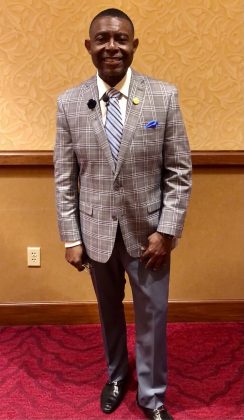By Haley Wilson
The Birmingham Times
DeAnthony Allen knows how the stigma about therapy can keep many Black men from seeking much-needed and beneficial services dealing with mental health.
“[Some people think] that if you discuss private matters publicly, they could come back and hurt you,” said Allen, a 36-year-old educator who lives in Birmingham.
Though he has always been an advocate for therapy, Allen hasn’t always sought those services for himself “because I was dealing with the same stigma [that other people had about therapy], even as an educated black man,” he said.
After overcoming those fears, Allen has become a new man.
“I’ve been receiving therapeutic services for about three years now. I also was recently diagnosed with [attention deficit hyperactivity disorder (ADHD)]—and here I am. As a professional who is just now finding out that I have a disorder that’s affecting me, … I was able to identify issues from my past that had been dormant. Once I was able to figure out how to mitigate those, I found incredible success.”
Michael Towns, owner of a health-and-fitness business, has also seen the value of therapy which he said is “actually necessary.”
“A lot of times we see ourselves in the mirror every day, so we don’t notice what’s different. But someone who doesn’t see you every day, … may see a lot of things you don’t see,” he said.
Allen and Towns, as well as a group of Birmingham-area therapists, spoke to The Birmingham Times about the steps they are taking to increase awareness about the importance of mental well being in the Black community, especially among Black men during National Minority Mental Health Awareness Month.
Importance of Therapy
Calling attention to mental health among people of color in July is important for several reasons, according to J.C. Wells, a licensed professional counselor with the Birmingham-based Without Walls Counseling Services.
“I think Minority Mental Health Awareness Month matters because all of my life and through all the generations before me, it has been taboo to discuss mental health,” he said. “In the Black community, there’s a saying: ‘Pray about it, and let God have it’—and that’s it. That’s the model most of us in the Black community have lived by; it has made its way into Black communities, and we are seeing the effects of that model not working.
“It is absolutely critical to alert and alarm communities that it’s OK to seek counseling; it helps, and it does matter. We have to be able to do more than just pray,” he said.
Rashad Hayes, a medical social worker and case manager at the University of Alabama at Birmingham (UAB), said Minority Mental Health Awareness Month needs to be recognized “because it allows everybody to know the significance behind it.”
“When you think about Black History Month, even though we should be having that all year, we get the one month to really focus on it,” Hayes said. “This is a way to help everybody and kind of bring everybody together, like, ‘Hey, this is a problem we all have, not just one person. … Together we can make that difference.’”
The stigma surrounding mental illness that prevents some people from getting help is not healthy, Hayes said.
“I think a lot of African Americans struggle with not wanting to feel like we are the weakest link,” he said. “Because of that, we end up suppressing our own thoughts and our own feelings, which then causes us to lash out at the wrong people or hurt the main people that are trying to help us.”
Wells agreed.
“The minority community over different generations really hasn’t addressed mental health issues. Rather, there has been a certain stigma or a lack of awareness,” Wells said.
“I think having a month [designated to raise awareness about mental health in communities of color] brings an opportunity to highlight the importance of it because it provides opportunities to talk about it, hold conversations about it,” he added. “That will help break down the stigma and put people more in the mindset of wanting to address those concerns.”
Jacques Austin, a licensed professional counselor with a private practice, JL Austin Counseling and Consulting, in Homewood, AL said shedding light on mental health is vital for Blacks. “I think having a month brings an opportunity to highlight the importance of it, because [that means] we’re talking about it, we’re holding conversations about it. That will help break down the stigma and put people more of in the mindset of wanting to address those concerns.”
Dealing With Emotions
Artie C. Nelson, M.D., a psychiatrist in Birmingham, said many people want to show that they “have it all together,” and they believe asking for help may show a sign of weakness.
“Vulnerability makes some people uncomfortable, but we need to take what makes [us] uncomfortable and use it for good,” he said. “There is no way to become comfortable in the first place unless you start there.”
Historically, Black people haven’t had the ability or experience a full range of emotions, so having a chance to discuss mental health is very important, said Herbert Wilkerson, a licensed professional counselor at UAB.
“Not being able to deal with mental health throughout history, along with the historical trauma endured through enslavement, reconstruction, Jim Crow, mass incarceration, systematic oppression, … [Black people] have not had the ability or the freedom to deal with our emotions,” he said. “We deal with things by internalizing them, so I think it’s important that we have those conversations now in order to destigmatize and normalize addressing our mental health.”
Hayes said he looks for ways around the stigma.
“I’ve found that more people are open to saying, ‘Hey I have a life coach,’ instead of saying, ‘Hey, I have a therapist,’” he said. “I operate a lot of myself from life coaching, but I’m able to show people [the benefits of therapy]. I ask them, ‘Hey, how was this? Did you enjoy this experience?’ Then I say, ‘Now imagine what therapy can do for you,’ while continuing to try to guide them through these steps.
“… I let them know that if they get this help, it’s not going to mean they are crazy. I just try to … change the perspective about what it means to actually get help and receive help,” he said.
Causes of the Stigma
The therapists who spoke to The Birmingham Times stressed the importance of getting people to talk about mental health issues.
“In the Black community, we always have to be strong, we always have to show our strength,” said Hayes. “As a child, I was always told, ‘What happens in this house stays in this house.’ We were never supposed to let people know about things that went on in our home. … [A lot of Black people have] that persona of acting like they have it all together … instead of changing the things that need to be changed to actually have it all together.”
For those who grew up in families that adhered to the “what happens in this house stays in this house” mantra, when they are suffering through trauma in the house, there is nowhere to take that trauma because they can’t take it anywhere else, said Austin.
“We grow up and live under those same rules as adults,” he added. “Everybody wants to be a strong person. In reality, though, a strong person is someone who is able to face their fears, face the things that bother them, and say, ‘Hey, this is what my issue is, but I’m willing to face it.’ I think we have this misinterpretation of what it is to be mentally strong. It really just takes breaking down to somebody and getting the help you need.”
Annual Mental Health Checkups
Allen, the educator, said seeking therapy has been “wrongfully equated with weakness. … I think that is especially true in the South.”
“Seeking out mental health professionals and really getting the healing that is necessary requires a level of vulnerability. It requires a level of acknowledgement of trauma inadequacy, which is sort of countercultural in the minds of some. It’s also about this idea of masculinity, of not showing vulnerability.”
Towns, the business owner in Birmingham, believes getting therapy is no different from other wellness checkups.
“I think it’s a good avenue to help a person be better in some facet—and we all can be better,” he said. “I love talking to a therapist because the therapist is not judging me; they are here to help. … To me, that’s part of wellness. It’s like going to get a checkup; an annual mental checkup is no different than going to get your cholesterol and blood sugar checked.”
For more resources and information related to minority mental health, visit MentalHealth.gov, as well as the websites for National Alliance on Mental Health (nami.org) and Mental Health America (www.mhanational.org).
Updated at 5:41 p.m. om 7/19/2021 to clarify and add quotes.

